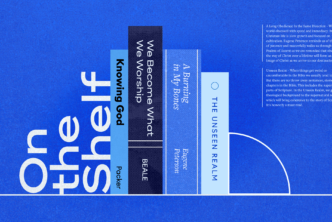Old Testament scholar Tremper Longman not only teaches the book of Proverbs—but also how to preach the book of Proverbs.
The following excerpt adapted from Longman’s Mobile Education course Preaching Proverbs appears in segment 24: “Proverbs Are Not Always True.”
***
It’s extremely important, when we’re reading, teaching, or preaching from the book of Proverbs, to keep it in mind that proverbs as a genre are not making claims to universal validity. They are not true in every situation. They are only true when applied to the right situation. Any individual proverb doesn’t give us even Proverbs’s full understanding of a topic.
We’ll address that more later, when we talk about the organization of the book of Proverbs. But now I simply want to emphasize how important it is to keep it in mind that proverbs aren’t always true. You could do great damage by thinking otherwise.
Wise son, happy father? (Proverbs 10:1)
Let’s take an example from Proverbs 10:1; and I know I remember hearing about a seminar (sort of a weekend conference) where the speaker was using the proverbs as if they were . . . eternally valid laws. He would turn to a proverb like Proverbs 10:1, which says, “A wise son makes a father glad, and a foolish son is the sorrow of his mother,” and basically say [that] in all circumstances, children, no matter what their age, should reflect on their relationship with their parents, and if they’re making them happy, then they are wise, but if they’re bringing them sorrow, then they are fools. . . .
With . . . understanding of wisdom and folly, it’s basically saying, “If you make your parents happy, then you’re acting like a proper worshiper of God. But if you’re making them unhappy, then you are a fool and acting like an idolater.” But the point is that this proverb assumes that your parents themselves are godly and what they want for you is that you have a good relationship with God. That seems to be the underlying assumption of this proverb.
I remember back in college—and we’re talking a while ago; early seventies, during not only the Jesus movement but also sort of in the first flash of the sexual revolution—that I had a friend who had just become a Christian, and one day she shared with me that her parents were extremely unhappy with her. I asked her why. She said, “Because I’m not sleeping around. They want me to experiment sexually. They’re upset with me because I’m not taking the pill.” Here’s a situation where the wise person would make their parents extremely unhappy. She was acting like a proper worshiper of Yahweh. So again, you can’t use Proverbs 10:1 to develop a simple barometer about whether or not you’re acting wisely or not.
Never boast? (Proverbs 27:1)
Let’s take a look at a few other proverbs in this regard. It [Prov 27:1] says, “Don’t brag about tomorrow, for you don’t know what the day will bear.” Now here, as we think about it, this proverb may very well be true all of the time, or at least most of the time. Again, it’s not that proverbs can’t be true all of the time, but we don’t know it from the proverb itself. We know it because other Scriptures will say the same thing.
Or verse 2: “Let a stranger brag about you and not your own mouth, someone you don’t know and not your own lips.” Again, that’s generally true. We don’t want to be bragging or [boastfully] promoting ourselves. But if that keeps you from highlighting your strengths in a job interview, that might not be the wisest thing in the world. But you don’t exaggerate your strengths. Again, each of these proverbs needs some reflection as you apply them to specific situations.
Jealousy worse than wrath? (Provebs 27:4)
How about [Proverbs 27] verse 4? “Wrath is cruel, and anger is a flood, and who can stand up in the face of jealousy?” I mean, this is basically saying jealousy is even worse and more damaging than wrath and anger. However, there are other Scripture passages that talk about God being a jealous God. Song of Songs 8 talks about the power of jealousy within a love relationship. Sometimes jealousy is an appropriate response to a threat to an exclusive relationship. I’ve talked about this with my friend Dan Allender in the book The Cry of the Soul, that yes, what Proverbs is talking about here is often true, that jealousy can be destructive. But there are situations in which jealousy, if properly acted upon, can be a positive thing.
I think of a friend of mine who was a fellow elder back years ago whose wife had an affair with another man, another elder. Afterward, thank God, they were reconciled. But he told me later, when I was talking about jealousy, he was saying to me, “When she started spending a lot of time with this other man, when she started working out with him three times a week, I felt jealous that she was spending so much time with him. But I just sort of crammed that emotion down because I thought that all jealousy was wrong. What I should have done was, of course, have that emotion motivate me to try to protect the relationship in, certainly not in any kind of violent or abusive way, but just simply say things like ‘I’m uncomfortable with you spending so much time with him; can I spend time with you?’ . . . .”
Again, applying the proverbs takes great care and reflection as we think about their timing.
***
This post is excerpted from Preaching Proverbs, taught by Tremper Longman.
For more insight into interpreting Proverbs and sharing it with others, get Preaching Proverbs today. Or for more observations on the Old Testament, explore all resources by Tremper Longman.
The headings and title of this post are the additions of the editor. The author’s views do not necessarily represent those of Faithlife.







